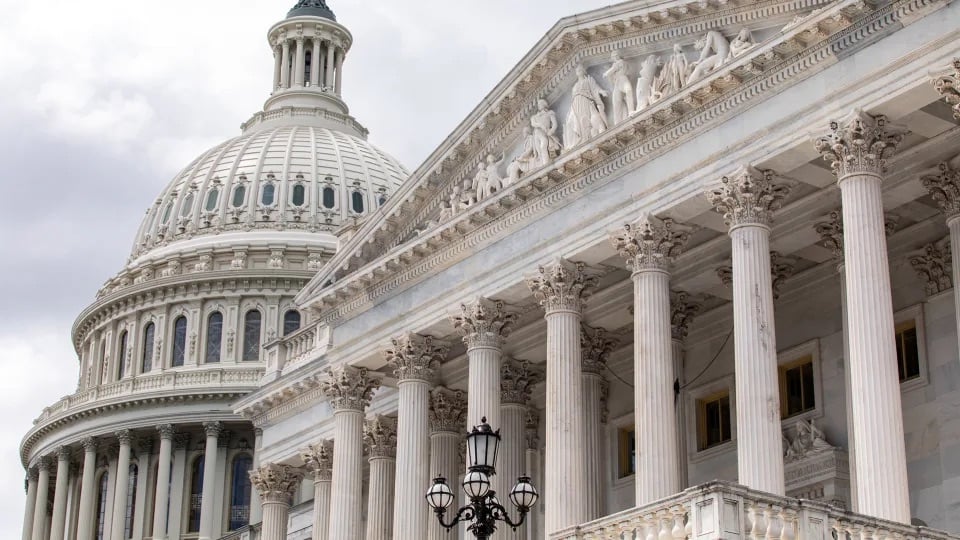Friday, April 28, 2023. Annette’s News Roundup.
I think the Roundup makes people feel not so alone.
To read an article excerpted in this Roundup, click on its blue title. Each “blue” article is hyperlinked so you can read the whole article.
Please feel free to share.
Invite at least one other person to subscribe today! buttondown.email/AnnettesNewsRoundup
___________________________
Joe is always busy.
Take the children to the White House. 2023.
This Take Your Child To Work Day, I had the honor of being protected by some of the toughest agents in town. pic.twitter.com/mYEZ8sDEj9
— President Biden (@POTUS) April 28, 2023

_____
Don’t Make Dianne Feinstein Resign. Just Get Her to the Senate by Any Means Necessary.
Walter Shapiro had quite an idea, 👇 and there is precedent.

It was June 10, 1964, and Clair Engle was dying. The first-term California senator was a blunt and flamboyant liberal, but now he was confined to a wheelchair and had trouble with words. Nonetheless, on this day, his aides wheeled him out onto the floor of the U.S. Senate so that he could cast one of the most important votes in the chamber’s history—and Engle did so not with his voice, but with an unforgettable gesture.
It’s a story that ought to guide the California senator who now holds his seat: the ailing Dianne Feinstein.
Engle had not appeared on the Senate floor since April 13. “At that time, he had struggled to his feet and tried to speak for a bill he wanted to introduce,” according to a New York Times report from Capitol Hill. “He had been unable to speak.” Such were the devastating aftereffects of the two operations that the 52-year-old Engle had undergone for a malignant brain tumor.
Two months later, Lyndon Johnson and Senate liberals desperately needed the vote of the homebound and dying Engle to break the Southern segregationist filibuster against the landmark Civil Rights Bill. Engle was rolled onto the Senate floor—“smiling slightly,” the Timesreported—to vote for cloture, which shuts off debate and moves legislation to a vote. Once again, Engle tried to speak. He could not. So he raised his left arm and pointed to his eye. Translation: “Aye.”
Even though his “yes” vote was not needed nine days later for final passage of the Civil Right Bill, Engle was back on the Senate floor in his wheelchair to be a part of history. Six weeks later, he died in his sleep.
Feinstein’s situation is somewhat different. The 89-year-old has been at home in San Francisco since February, recovering from shingles. No one appears to have a clear sense of when Feinstein will return to the Senate, since her arrival has been delayed more often than Godot’s.
So Democrats wait with frustration. Without Feinstein in Washington, they lack a majority on the Judiciary Committee. Five would-be Joe Biden judges are stuck in limbo, with more in the pipeline, since the committee’s Democrats don’t have the votes to move these nominees to the Senate floor. And last week, Senate Republicans objected to a scheme to temporarily replace Feinstein on the committee with a healthy Democrat. As long as Republicans can filibuster such mid-session committee membership changes, the Democrats are stymied.
It is tempting to believe that the problem would miraculously disappear if Feinstein belatedly resigned, because Democratic California Governor Gavin Newsom could then appoint a temporary successor. Left-wing California Congressman Ro Khanna has been particularly vocal in his calls for Feinstein to step aside.
There’s just one problem: The Democrats would need either unanimous consent or a filibuster-proof majority to appoint a senator to replace Feinstein on the Judiciary Committee in the middle of the term. Generally, during situations like this, the Senate operates under unanimous consent. But McConnell has defied Senate tradition before, especially with his refusal to even give Merrick Garland a hearing on his Supreme Court appointment in 2016. Jon Tester, Montana’s moderate Democratic senator, said recently that McConnell, who cares passionately about blocking liberal judges, would probably not relent even if Feinstein resigned. As Tester told Burgess Everett from Politico, “That’s what I’m hearing … it won’t make any difference.”
All of this brings us back to the stirring example of Clair Engle.
If there were any way for Feinstein to physically return to the Washington area—on a chartered medical plane if necessary—then she must do it. She could attend a few meetings of the Judiciary Committee, guided by aides and using a wheelchair, if needed. She doesn’t have to speak or follow the debate on the nominees. She just has to be able to point to her eye.(New Republic).
One more thing. Tell your Democratic Senators and/or Senator Durbin, head of the Judiciary Committee, that you think they should bring Senator Feinstein east for vote. The Senate Capitol Switchboard operator can also connect you directly with any Senator’s office. (202) 224-3121.
____
Yesterday, Mike Pence testified for hours before Special investigator Jack Smith’s Grand Jury.
Pence Appears Before Grand Jury on Trump’s Efforts to Retain Power.

What did Pence say to the Grand Jury? We don’t know but, as Ali Velshi, hosting The Lawrence O’Donnell show, pointed out - Pence already has publicly said much about his interaction with Trump on the days leading to January 6th.
He can’t back down from this 👇or his other oral and written description of the pressure Trump put on him to help overturn the 2020 Election. Remember what he has said.👇
My Last Days With Donald Trump
by Mike Pence, Nov. 9, 2022. Wall Street Journal.
Thirteen days after the 2020 election, I had lunch with President Trump. I told him that if his legal challenges came up short, he could simply accept the results, move forward with the transition, and start a political comeback, winning the Senate runoffs in Georgia, the 2021 Virginia governor’s race, and the House and Senate in 2022. Then he could run for president in 2024 and win. He seemed unmoved, even weary: “I don’t know, 2024 is so far off.”
In a Dec. 5 call, the president for the first time mentioned challenging the election results in Congress. By mid-December, the internet was filled with speculation about my role. An irresponsible TV ad by a group calling itself the Lincoln Project suggested that when I presided over the Jan. 6 joint session of Congress to count the electoral votes, it would prove that I knew “it’s over,” and that by doing my constitutional duty, I would be “putting the final nail in the coffin” of the president’s re-election. To my knowledge, it was the first time anyone implied I might be able to change the outcome. It was designed to annoy the president. It worked. During a December cabinet meeting, President Trump told me the ad “looked bad for you.” I replied that it wasn’t true: I had fully supported the legal challenges to the election and would continue to do so.
On Dec. 19, the president mentioned plans for a rally in Washington on Jan. 6. I thought that would be useful to call attention to the proceedings. I had just spoken with a senator about the importance of vetting concerns about the election before Congress and the American people. At the White House on Dec. 21, Ohio Rep. Jim Jordan led lawmakers in a discussion about plans to bring objections. I promised that all properly submitted objections would be recognized and fully debated.
On Dec. 23, my family boarded Air Force Two to spend Christmas with friends. As we flew across America, President Trump retweeted an obscure article titled “Operation Pence Card.” It alluded to the theory that if all else failed, I could alter the outcome of the election on Jan. 6. I showed it to Karen, my wife, and rolled my eyes.
On Dec. 30, Missouri Sen. Josh Hawley announced that he would co-sponsor election objections brought by representatives. I welcomed Sen. Hawley’s decision because it meant we would have a substantive debate. Without a senator’s support, I would have been required to dismiss House objections without debate, some-thing I didn’t want to do.
Early on New Year’s Day, the phone rang. Texas Rep. Louie Gohmert and other Republicans had filed a lawsuit asking a federal judge to declare that I had “exclusive authority and sole discretion” to decide which electoral votes should count. “I don’t want to see ‘Pence Opposes Gohmert Suit’ as a headline this morning,” the president said. I told him I did oppose it. “If it gives you the power,” he asked, “why would you oppose it?” I told him, as I had many times, that I didn’t believe I possessed that power under the Constitution.
“You’re too honest,” he chided. “Hundreds of thousands are gonna hate your guts. . . . People are gonna think you’re stupid.”
On Saturday, Jan. 2, I instructed my chief of staff to issue a statement supporting the right of lawmakers to bring objections under the Electoral Count Act. By Sunday morning, the headline “Pence Welcomes Congressional Republicans’ Bid to Challenge Electoral Votes” was every-where. When the president called me that morning, his mood had brightened. “You have gone from very unpopular to popular!” he exclaimed. But then he pressed me again to reject electoral votes unilaterally. “You can be a historic figure,” he said, “but if you wimp out, you’re just another somebody.”
On Jan. 4, the president’s chief of staff, Mark Meadows, summoned me to the Oval Office for a meeting with a long list of attendees, including the legal scholar John Eastman. I listened respectfully as Mr. Eastman argued that I should modify the proceedings, which require that electoral votes be opened and counted in alphabetical order, by saving the five disputed states until the end. Mr. Eastman claimed I had the authority to return the votes to the states until each legislature certified which of the competing slate of electors for the state was correct. I had already confirmed that there were no competing electors.
Mr. Eastman repeatedly qualified his argument, saying it was only a legal theory. I asked, “Do you think I have the authority to reject or return votes?”
Mr. Eastman repeatedly qualified his argument, saying it was only a legal theory. I asked, “Do you think I have the author-ity to reject or return votes?”
At that I turned to the president, who was distracted, and said, “Mr. President, did you hear that? Even your lawyer doesn’t think I have the authority to return electoral votes.” The president nodded. As Mr. Eastman struggled to explain, the president replied, “I like the other thing better,” presumably meaning that I could simply reject electoral votes.
On Jan. 5, I got an urgent call that the president was asking to see me in the Oval Office. The president’s lawyers, including Mr. Eastman, were now requesting that I simply reject the electors. I later learned that Mr. Eastman had conceded to my general counsel that rejecting electoral votes was a bad idea and any attempt to do so would be quickly overturned by a unanimous Supreme Court. This guy didn’t even believe what he was telling the president.
Right before going to bed, I saw that the Trump campaign had issued a statement. The New York Times reported that I had told the president I didn’t believe I had the power to block congressional certification of the election. That was true, but the statement called it “fake news.” I had a feeling that Jan. 6, 2021, was going to be a very long day.
I rose early that day and worked on my statement to Congress. When the phone rang a little after 11 a.m., it was the president. “Despite the press release you issued last night,” I said, “I have always been forthright with you, Mr. President.” I reiterated that I didn’t believe I had the power to decide which electoral votes would count and said I would be issuing a statement to Congress confirming that before the joint session started.
The president laid into me. “You’ll go down as a wimp,” he said. “If you do that, I made a big mistake five years ago!”
To read the rest of what Pence wrote in November 2022, click here.
______
Tucker Carlson breaks his silence.

Two days after being fired from Fox News, Tucker Carlson emerged on Twitter … with a two-minute video that didn’t address his shocking ouster. But he may have offered a hint about what he’ll do next after his surprise exit from Rupert Murdoch’s media empire.
Carlson criticized the state of political discourse, saying, “both political parties and their donors have reached consensus on what benefits them and they actively collude to shut down any conversation about it.”
“Where can you still find Americans saying true things? There aren’t many places left,” Carlson added. “But there are some. And that’s enough.” He concluded with “See you soon,” suggesting that he may return to the public forum, either on his own or as part of some news media outlet.
More details have emerged about Carlson’s firing. The Times reports that just before Fox News’s defamation trial was set to begin, the Fox board belatedly learned more about highly offensive and crude remarks that the host had made privately — and that surfaced as part of the legal discovery process.
The full extent of what he said is still not known, but news outlets have challenged court-ordered redactions of the private messages, and the communications could still emerge in a lawsuit against Fox News filed by the voting software maker Smartmatic. (The DealBook, New York Times).
Touch 👇 if you want to watch Carlson’s video.
Good evening pic.twitter.com/SPrsYKWKCE
— Tucker Carlson (@TuckerCarlson) April 27, 2023
___________________________
Don’t Expect this Republican Megadonor to give blue but at least he won’t give red.

Peter Thiel, Republican megadonor, won’t fund candidates in 2024, sources say.
SAN FRANCISCO, April 26 (Reuters) - Tech billionaire and Republican megadonor Peter Thiel, an early backer of former President Donald Trump who later broke with him, has told associates he is not planning to donate to any political candidates in 2024, according to two people close to the businessman.
Thiel is unhappy with the Republican Party's focus on hot-button U.S. cultural issues, said one of the sources, a business associate, citing abortion and restrictions on which bathrooms transgender students can use in schools as two examples.
The German-born entrepreneur [who is gay] has a fortune estimated at around $4.2 billion after co-founding PayPal (PYPL.O) and Palantir (PLTR.N) and investing early in Facebook (META.O). He has contributed around $50 million to state and federal political candidates and campaigns since 2000, and he was the 10th largest individual donor to either party in the 2022 midterm congressional elections, according to the non-profit OpenSecrets.(Reuters)
___________________________
Ex-New Zealand Prime Minister Jacinda Ardern to join Harvard.

CAMBRIDGE, Mass. (AP) — Former New Zealand Prime Minister Jacinda Ardern, who led her country through a devastating mass shooting, will be temporarily joining Harvard University later this year, Kennedy School Dean Douglas Elmendorf said Tuesday.
Ardern, a global icon of the left and an inspiration to women around the world, has been appointed to dual fellowships at the Harvard Kennedy School. She will serve as the 2023 Angelopoulos Global Public Leaders Fellow and a Hauser Leader in the school’s Center for Public Leadership beginning this fall.
“Jacinda Ardern showed the world strong and empathetic political leadership,” Elmendorf said in statement, adding that Ardern will “bring important insights for our students and will generate vital conversations about the public policy choices facing leaders at all levels.”
Ardern, who was just 37 when she became prime minister in 2017, shocked New Zealanders when she announced in January she was stepping down from the role after more than 5 years because she no longer had “enough in the tank” to do it justice. She was facing mounting political pressures at home, including for her handling of the coronavirus pandemic, which was initially widely lauded but later criticized by those opposed to mandates and rules.
She said she sees the Harvard opportunity as a chance not only to share her experience with others, but also to learn.
“As leaders, there’s often very little time for reflection, but reflection is critical if we are to properly support the next generation of leaders,” she said.
Ardern’s time at the Cambridge, Massachusetts, university will also include a stint as the first tech governance leadership fellow at the school’s Berkman Klein Center for Internet & Society.
The center has been an important partner as New Zealand worked to confront violent extremism online after a white supremacist gunman killed 51 people at two mosques in the city of Christchurch in 2019, Ardern said. (Associated Press)
___________________________
The Equal Rights Amendment is once again on the ropes, for now.
Senate fails to advance Equal Rights Amendment resolution.

The Senate on Thursday failed to advance a resolution to remove the deadline for ratification of the Equal Rights Amendment, a proposed amendment to the Constitution.
The resolution failed 51-47. Although it had two Republican co-sponsors – Sens. Lisa Murkowski of Alaska and Susan Collins of Maine – most GOP senators opposed it. Republicans have generally argued they don’t think the amendment is needed because of the equal protections provided to women in the 14th Amendment.
Supporters, however, say the ERA would ban discrimination on the basis of sex and guarantee equality for all under the Constitution.
The vote served as a way for Democrats to put Republicans on the spot over the issue, but there has been little to no expectation that both chambers of Congress would pass the resolution.
The ERA has been ratified by 38 states, seemingly meeting the required three-fourths needed to be approved. However, some of those states adopted it after a congressionally mandated deadline had passed, raising questions about the validity of those actions, and several others later rescinded their support.
The failed resolution would have waived the deadline, paving the way for the ERA to be adopted if both chambers of Congress passed and it was signed into law by the President. “This joint resolution provides that the Equal Rights Amendment, which prohibits discrimination on the basis of sex, was ratified by three-fourths of the states and is therefore a valid constitutional amendment, regardless of any time limit that was in the original proposal,” according to a summary of the legislation.
Ahead of Thursday’s vote, Senate Majority Leader Chuck Schumer urged his colleagues to support the legislation.
“This resolution is necessary as it is time when America can never hope to be a land of freedom and opportunity so long as half its population is treated like second class citizens” Schumer said.
Schumer pointed to the Supreme Court’s decision last year to overturn Roe v. Wade to argue the ERA should be passed now.
“In 2023, we should move forward to ratify the ERA with all due haste, because if you look at the terrible things happening to women’s rights in this country … women in America have far fewer rights today than they did even year ago,” Schumer said.
Before Thursday’s vote, the White House urged the Senate to pass the ERA, saying in a statement that “no one’s rights should be denied on account of their sex. It is long past time to definitively enshrine the principle of gender equality in the Constitution.”(CNN)
___________________________
The white woman who betrayed a 14 year old black Emmett Till is dead.
She accused Emmett, 14, of accosting her, and her testimony led to the acquittals of her husband and his half brother in a murder that helped galvanize the civil rights movement.
Carolyn Bryant Donham Dies at 88; Her Words Doomed Emmett Till.

Emmett Till with his mother, later known as Mamie Till Mobley, in about 1950.

Carolyn Bryant with her husband, Roy Bryant, and their children during his trial in 1955.
Only two people knew exactly what happened during the minute they were alone together in the general store in Money, Miss., on Aug. 24, 1955. One, Emmett Till, a Black teenager visiting from Chicago, died four days later, at 14, in a brutal murder that stands out even in America’s long history of racial injustice.
The other was Carolyn Bryant. She was the 21-year-old white proprietress of the store where, according to her testimony in the September 1955 trial of her husband and his half brother for the murder, Emmett made a sexually suggestive remark to her, grabbed her roughly by the waist and let loose a wolf whistle.
Now Mrs. Bryant, more recently known as Carolyn Bryant Donham, has died at 88. On Thursday, Megan LeBoeuf, the chief investigator for the Calcasieu Parish coroner’s office in Louisiana, sent a statement confirming the death, on Tuesday, in Westlake, a small city in southern Louisiana. Ms. LeBoeuf did not provide further information.
With Mrs. Bryant’s death, the truth of what happened that August day may now never be clear. More than half a century after the murder, Timothy B. Tyson, a Duke University historian who interviewed her, wrote that she had admitted to him that she had perjured herself on the witness stand to make Emmett’s conduct sound more threatening than it actually was — serving, in Dr. Tyson’s words, as “the mouthpiece of a monstrous lie.” (New York Times).
___________________________
Brittney Griner speaks.

The 8 time WNBA all star, who has 2 Olympic Gold Medals, recently detained in a Russian jail for 10 months, grew emotional when she declared she will never play basketball overseas again.
The Russian team, UMKC Ekaterinburg paid her more than $1 million per year to play in Russia, Mostly we go because there’s a ton of money,” legendary point guard Sue Bird told ESPN.
In January [2022], the WNBA and its players’ union agreed on a new labor agreement contract that increased pay and improved benefits (including the addition of paid maternity leave). Average compensation topped $100,000 for the first time; the minimum salary increased to $57,000 for rookies and $68,000 for more experienced players. Maximum salaries nearly doubled from $117,500 to $215,000.
How does that compare to the NBA?
They’re not close to being in the same league financially. The average NBA player earns $5.3 million a year; the average WNBA player brings in $130,000 a year. The difference among elite players is more striking. Stephen Curry tops the NBA list at $48 million, compared to the highest-paid WNBA stars (Diana Taurasi, Jewell Loyd and Breanna Stewart) who earn $228,094. (Source of data, the Grio).
___________________________
Congressman Jamie Raskin, out of treatment, after 6 rounds of chemo, made me smile.
Tuesday I thanked nurses, doctors & pharmacists at
@MedStarGU who serve with splendid kindness—and saved my life over 5 months. I finished 6 rounds of 5-day chemo sessions—which they organized so I didn’t have to miss votes or hearings—and I rang the bell! A new chapter begins.
Tuesday I thanked nurses, doctors & pharmacists at @MedStarGUH who serve with splendid kindness—and saved my life over 5 months. I finished 6 rounds of 5-day chemo sessions—which they organized so I didn’t have to miss votes or hearings—and I rang the bell! A new chapter begins. pic.twitter.com/lAtpGyBG5b
— Jamie Raskin (@jamie_raskin) April 27, 2023
90% chance of no relapse. Go, Jamie, go.
Enjoy.
___________________________